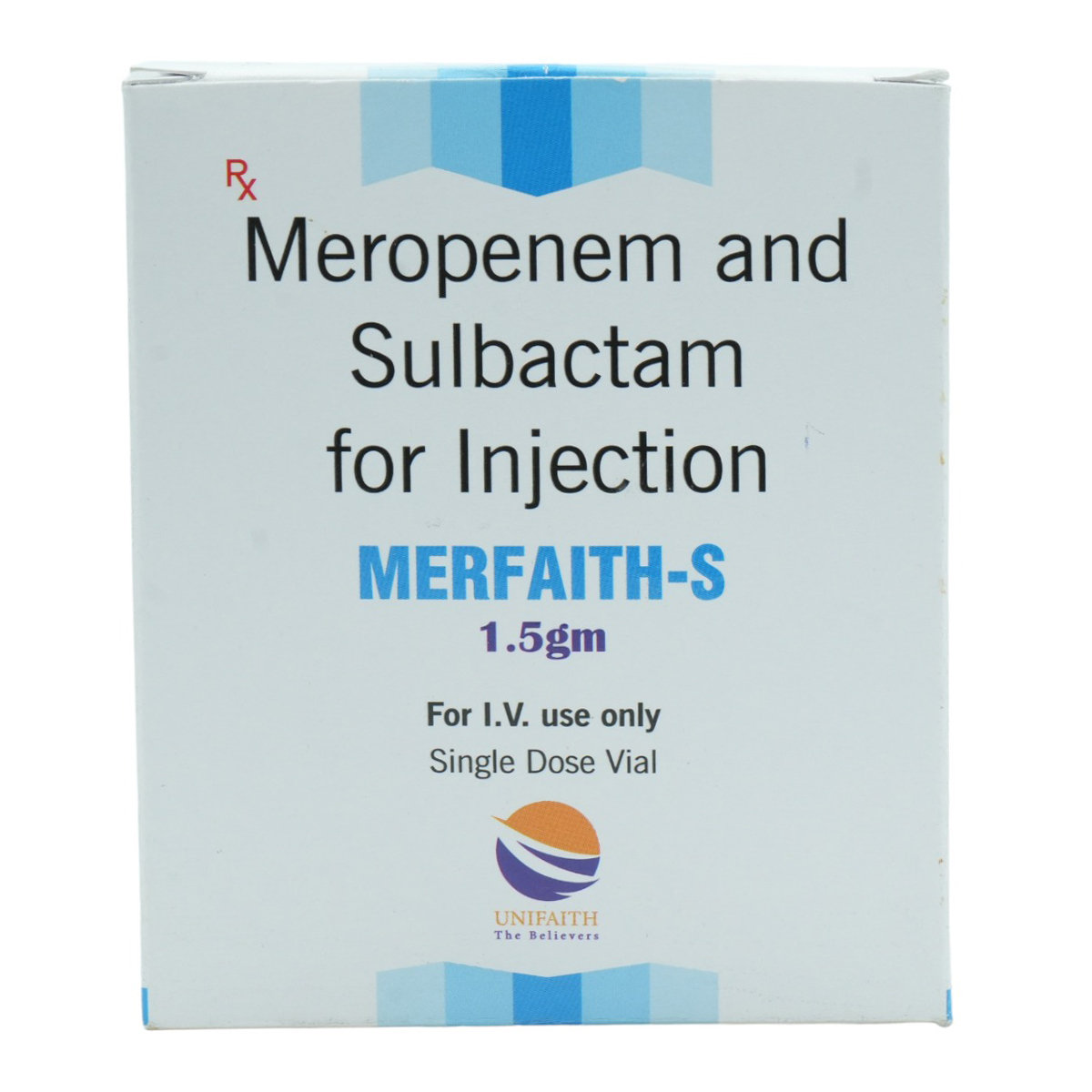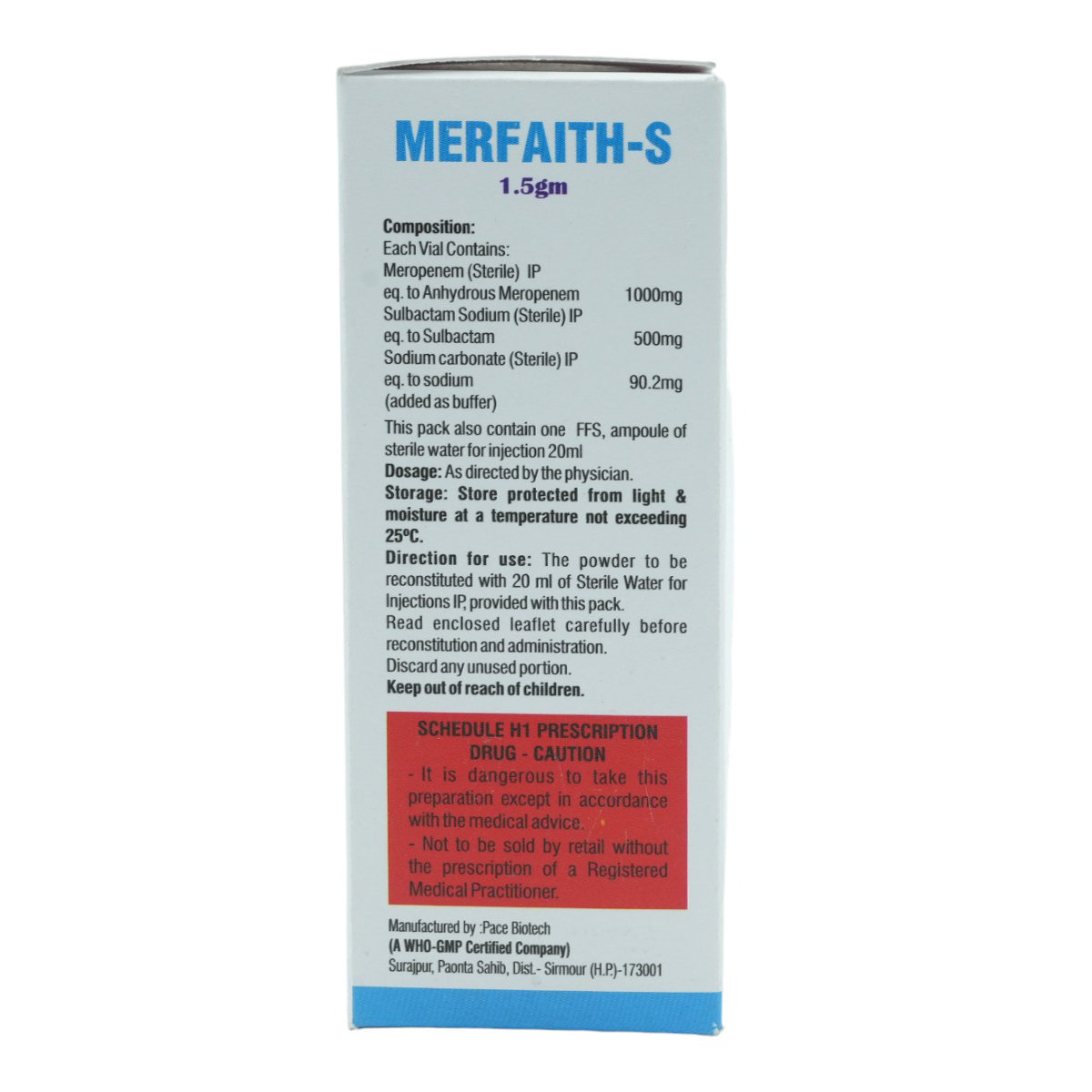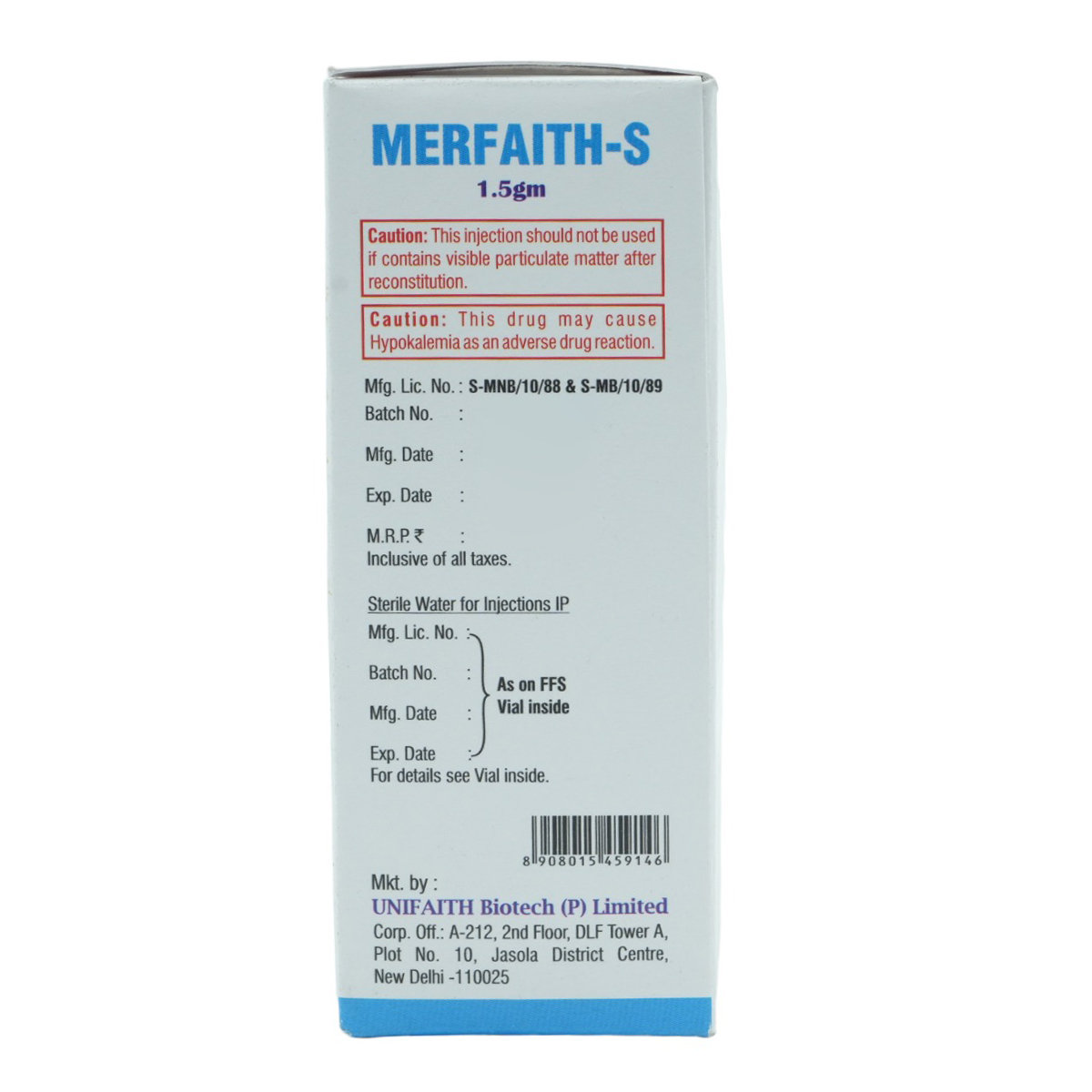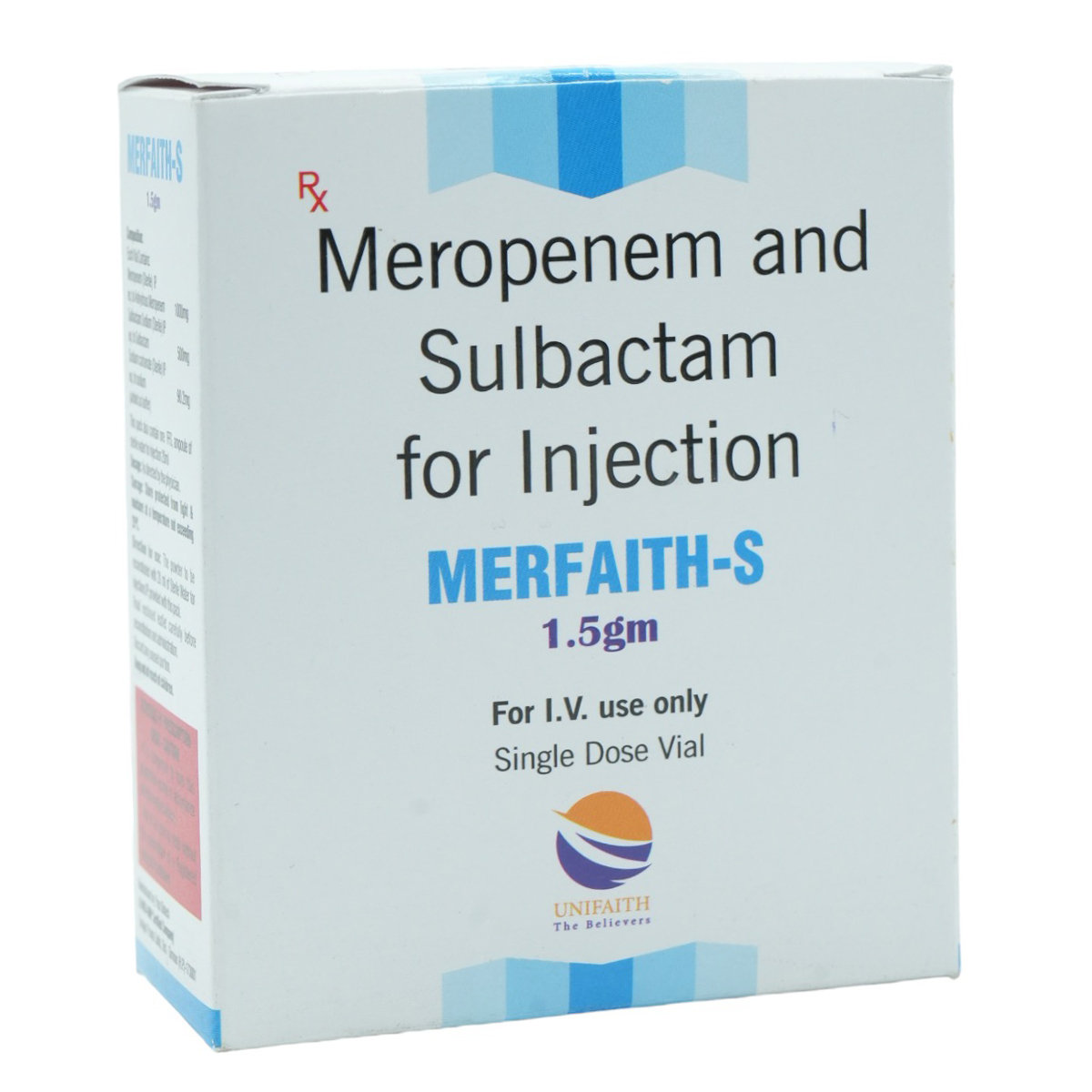Merfaith-S 1.5 gm Injection 1's
MRP ₹2905
(Inclusive of all Taxes)
₹435.8 Cashback (15%)
Provide Delivery Location
Online payment accepted
 Prescription drug
Prescription drugWhats That
Composition :
Manufacturer/Marketer :
Consume Type :
Expires on or after :
Return Policy :
About Merfaith-S 1.5 gm Injection
Merfaith-S 1.5 gm Injection belongs to the group of medications called anti-infectives used to treat bacterial infections. Bacterial infections are caused by the multiplication of harmful bacteria inside or on the body. These harmful bacteria produce chemicals known as toxins, which can damage tissue and make you sick. Symptoms of bacterial infection vary depending on the organ affected by bacteria.
Merfaith-S 1.5 gm Injection contains Meropenem and Sulbactam. Meropenem is a type of antibiotic. It works by preventing the formation of the bacterial protective covering, which is required for bacterial survival. Sulbactam is a beta-lactamase inhibitor that reduces resistance and improves Meropenem antibacterial activity.
Merfaith-S 1.5 gm Injection should only be administered under the supervision of a healthcare professional. The dose depends on the type of infection you have, where the infection is in the body, and how severe the infection is. Your doctor will decide on the dose that you need. The common side-effects of Merfaith-S 1.5 gm Injection may include injection site reactions that may occur, including swelling, pain, itching, nausea, vomiting, diarrhoea, headache, and rash. These side effects are usually mild and temporary. However, if any of these side effects persist or get worse, inform your doctor immediately.
To treat your condition effectually, continue using Merfaith-S 1.5 gm Injection for as long as your doctor has prescribed it. Do not use Merfaith-S 1.5 gm Injection without a doctor's advice if you had a skin reaction or irritation to any medicine. Consult your doctor before using Merfaith-S 1.5 gm Injection if you are pregnant or breastfeeding. Do not use Merfaith-S 1.5 gm Injection in more than prescribed doses or longer duration as it may cause adverse effects. Do not discontinue or abruptly stop the medication as it may lead to antibiotic resistance, a condition in which bacteria become resistant to antibiotics. Keep your doctor informed about your health condition and all the medicines you take before taking Merfaith-S 1.5 gm Injection to rule out any side effects. It is not known whether Merfaith-S 1.5 gm Injection can interact with alcohol or may affect your ability to drive. So, please discuss with your doctor the possible risks and benefits before taking this medicine.
Uses of Merfaith-S 1.5 gm Injection
Directions for Use
Key Benefits
Merfaith-S 1.5 gm Injection contains Meropenem and Sulbactam. Meropenem is an antibiotic that treats the infection by killing the bacteria. Sulbactam is a beta-lactamase (an enzyme produced by bacteria that can destroy antibiotics) inhibitor and prevents the destruction of Meropenem from the bacteria. Merfaith-S 1.5 gm Injection has broad-spectrum activity and is effective against both gram-positive and gram-negative bacteria. It is used to treat bacterial infections such as skin infections, gynecological infections, and intra-abdominal infections.
Storage
- Inform Your Doctor: Notify your doctor immediately about your diarrhoea symptoms. This allows them to adjust your medication or provide guidance on managing side effects.
- Stay Hydrated: Drink plenty of fluids to replace lost water and electrolytes. Choose water, clear broth, and electrolyte-rich drinks. Avoid carbonated or caffeinated beverages to effectively rehydrate your body.
- Follow a Bland Diet: Eat easy-to-digest foods to help firm up your stool and settle your stomach. Try incorporating bananas, rice, applesauce, toast, plain crackers, and boiled vegetables into your diet.
- Avoid Trigger Foods: Steer clear of foods that can worsen diarrhoea, such as spicy, fatty, or greasy foods, high-fibre foods, and dairy products (especially if you're lactose intolerant).
- Practice Good Hygiene: Maintain good hygiene to prevent the spread of infection. To stay healthy, wash your hands frequently, clean and disinfect surfaces regularly, and avoid exchanging personal belongings with others.
- Take Anti-Diarrheal Medications: If your doctor advises, anti-diarrheal medications such as loperamide might help manage diarrhoea symptoms. Always follow your doctor's directions.
- Keep track of your diarrhoea symptoms. If they don't get better or worse or are accompanied by severe stomach pain, blood, or dehydration signs (like extreme thirst or dark urine), seek medical help.
- If you have symptoms such as pain, swelling, redness, or warmth in your veins after taking medication, contact your doctor right once. Share information about your symptoms, medication regimen, and medical history.
- Your doctor will then assess your medication regimen to determine if it's contributing to the thrombophlebitis. This assessment will help identify the best course of action to manage your condition and prevent further complications.
- Your doctor may suggest certain diet and lifestyle changes to help manage your condition. This may include increasing your intake of foods rich in omega-3 fatty acids, staying hydrated, exercising regularly, and maintaining a healthy weight. Your doctor may also advise medications to reduce inflammation, prevent blood clots, or manage pain if necessary.
- If your condition does not improve or persists, consult your doctor and report your condition. Your doctor will assess your progress, adjust your treatment plan if necessary, and provide appropriate advice to ensure the best possible outcome.
- Inform your doctor about the nausea and discuss possible alternatives to the medication or adjustments to the dosage.
- Divide your daily food intake into smaller, more frequent meals to reduce nausea.
- Opt for bland, easily digestible foods like crackers, toast, plain rice, bananas, and applesauce.
- Avoid certain foods that can trigger nausea, such as fatty, greasy, spicy, and smelly foods.
- Drink plenty of fluids, such as water, clear broth, or electrolyte-rich beverages like coconut water or sports drinks.
- Use ginger (tea, ale, or candies) to help relieve nausea.
- Get adequate rest and also avoid strenuous activities that can worsen nausea.
- Talk to your doctor about taking anti-nausea medication if your nausea is severe.
- Record when your nausea occurs, what triggers it, and what provides relief to help you identify patterns and manage your symptoms more effectively.
- Hydrate your body: Drink enough water to prevent dehydration and headaches.
- Calm Your Mind: Deep breathing and meditation can help you relax and relieve stress.
- Rest and Recharge: Sleep for 7-8 hours to reduce headache triggers.
- Take rest: lie down in a quiet, dark environment.
- Cold or warm compresses can help reduce tension.
- Stay Upright: Maintain good posture to keep symptoms from getting worse.
- To treat headaches naturally, try acupuncture or massage therapy.
- Over-the-counter pain relievers include acetaminophen and ibuprofen.
- Prescription Assistance: Speak with your doctor about more substantial drug alternatives.
- Severe Headaches: Seek emergency medical assistance for sudden, severe headaches.
- Frequent Headaches: If you get reoccurring headaches, consult your doctor.
- Headaches with Symptoms: Seek medical attention if your headaches include fever, disorientation, or weakness.
- Include iron-rich foods like dark leafy vegetables, lean red meat, legumes and fish in your diet.
- Consume vitamin C-rich foods as they aid iron absorption.
- Limit tea, cocoa, and coffee as these can slow iron absorption.
- Exercise regularly; however, do not overdo it.
- Stay hydrated by drinking plenty of water to help reduce swelling.
- Include anti-inflammatory foods like turmeric, ginger, and omega-3 rich foods in your diet.
- Avoid processed and high-sodium foods that can exacerbate swelling.
- Utilize an ice pack wrapped in a cloth to cool the affected area, helping to alleviate swelling and discomfort.
- Gently massage the site, if recommended by your healthcare provider, to promote lymphatic drainage.
- Rotate injection sites to minimize irritation and swelling.
- Allow your body time to rest and recuperate, limiting physically demanding tasks to facilitate a smoother recovery.
Drug Warnings
It is not recommended to take Merfaith-S 1.5 gm Injection if you are allergic to other antibiotics or this medicine's contents. Merfaith-S 1.5 gm Injection is not recommended for people with infectious mononucleosis (viral infection with sore throat and fever) and colitis (intestine inflammation). Merfaith-S 1.5 gm Injection should be used with caution in patients with kidney impairment. Do not discontinue or abruptly stop the medication as it may lead to antibiotic resistance, a condition in which bacteria become resistant to antibiotics. Should use Merfaith-S 1.5 gm Injection with caution in children, pregnant women, breastfeeding mothers and older people. It is not known whether Merfaith-S 1.5 gm Injection can interact with alcohol or may affect your ability to drive. So, please discuss with your doctor the possible risks and benefits before taking this medicine.
Drug-Drug Interactions
Drug-Drug Interactions
Login/Sign Up
Co-administration of Metrizamide and Merfaith-S 1.5 gm Injection together can increase the risk of seizures.
How to manage the interaction:
Taking Merfaith-S 1.5 gm Injection with Metrizamide together can possibly result in an interaction, but it can be taken if your doctor has advised it. If you notice any of these signs - being closely monitored by your doctor, having seizures, or having a condition or head injury - contact a doctor right away. Do not stop using any medications without a doctor's advice.
When BCG vaccine is used with Merfaith-S 1.5 gm Injection, its effectiveness may be reduced.
How to manage the interaction:
Taking Merfaith-S 1.5 gm Injection with the BCG vaccine together can possibly result in an interaction, but it can be taken if a doctor has advised it. Do not stop using any medications without talking to a doctor.
Co-administration of Iomeprol and Merfaith-S 1.5 gm Injection together can increase the risk of causing seizures.
How to manage the interaction:
Taking Merfaith-S 1.5 gm Injection with Iomeprol together can possibly result in an interaction, but it can be taken if your doctor has advised it. If you notice any of these signs - close monitoring, seizures, or head injury - contact a doctor right away." Do not stop using any medications without talking to a doctor.
Taking Tramadol with Merfaith-S 1.5 gm Injection together may cause higher levels of Merfaith-S 1.5 gm Injection in the blood.
How to manage the interaction:
Taking Merfaith-S 1.5 gm Injection with Tramadol together can possibly result in an interaction, it can be taken if your doctor has advised it. However, if you experience any symptoms such as confusion, hallucination, seizure, increased heart rate, blurred vision, tremors, incoordination, stomach cramps, nausea, vomiting, and diarrhea, contact a doctor immediately. Do not discontinue any medications without consulting a doctor.
Co-administration of Divalproex and Merfaith-S 1.5 gm Injection can reduce the blood levels of Divalproex sodium.
How to manage the interaction:
Co-administration of Divalproex with Merfaith-S 1.5 gm Injection can possibly result in an interaction, but it can be taken if your doctor has advised it. Do not discontinue any medications without a doctor's advice.
Co-administration of Meropenam and Sodium valproate together can reduce the effect of Sodium valproate.
How to manage the interaction:
Co-administration of Meropenam and Sodium valproate can lead to an interaction, but it can be taken if your doctor advises. However, if you experience any unusual symptoms, consult a doctor immediately. Do not discontinue any medications without consulting a doctor.
Drug-Food Interactions
Drug-Food Interactions
Login/Sign Up
Diet & Lifestyle Advise
- Probiotics should be taken after taking an entire course of Merfaith-S 1.5 gm Injection to restore some healthy bacteria in the intestines that may have been killed. Taking probiotics after antibiotic treatment can reduce the risk of antibiotic-associated diarrhoea. Certain fermented foods like yoghurt, cheese, sauerkraut, kombucha, and kimchi can help restore the intestine's good bacteria.
- Include more fibre enriched food in your diet, as it can be easily digested by your gut bacteria, which helps stimulate their growth. Thus, fibre rich foods may help restore healthy gut bacteria after a course of antibiotics. Whole grains like whole-grain bread, brown rice should be included in your diet.
- Avoid alcoholic beverages with Merfaith-S 1.5 gm Injection as it can make you dehydrated and may affect your sleep. This can make it harder for your body to aid the Merfaith-S 1.5 gm Injection in fighting off infections.
Side Effects of Merfaith-S 1.5 gm Injection
- Stomach pain
- Feeling sick (nausea)
- Vomiting
- Diarrhoea
- Headache
- Pain and inflammation
- A tingling feeling
Habit Forming
Therapeutic Class
All Substitutes & Brand Comparisons
RX
Out of StockNot for online saleAqumer-MS 1.5G Injection
₹999
(₹899.1 per unit)
62% CHEAPERRX
Not for online saleMero SB 1.5gm Injection 1's
Aristo Pharmaceuticals Pvt Ltd
₹1095
(₹985.5 per unit)
58% CHEAPERRX
Out of StockNot for online saleBrodnem-S Injection
₹1499
(₹1349.1 per unit)
43% CHEAPER
Author Details
We provide you with authentic, trustworthy and relevant information
Drug-Diseases Interactions
Drug-Diseases Interactions
Login/Sign Up
FAQs
Drug-Drug Interactions Checker List
- VALPROIC ACID
- SODIUM VALPROATE
- PROBENECID
- DABIGATRAN
- APIXABAN
Special Advise
- When administering prolonged therapy, monitor renal, hepatic, and hematologic functions periodically. Also monitor for signs of anaphylaxis during the first dose.
- Even if you feel better after taking Merfaith-S 1.5 gm Injection, do not stop taking it until your doctor says so. It might cause the symptoms to reappear and make the infection difficult to treat due to antibiotic resistance.
Disease/Condition Glossary
Bacterial infections: A bacterial infection is a condition in which harmful bacteria enter, multiply and infect the body. It can target any organ of the body and multiply very quickly. Bacterial infections vary from minor illnesses (like sore throat and ear infections) to severe brain infections (like meningitis and encephalitis). When infected with bacteria, you can experience generalized symptoms, like fevers, chills, and fatigue. Few harmful bacteria that commonly cause infections include Streptococcus, Staphylococcus, and E. coli. Anyone can get a bacterial infection, but people with a weak immune system or taking immunosuppressive medicines like steroids are more prone to infections.

Have a query?
Alcohol
Safe if prescribed
Alcohol may increase the side effects of Merfaith-S 1.5 gm Injection. Hence, it is advised to limit the intake of alcohol while using Merfaith-S 1.5 gm Injection.
Pregnancy
Consult your doctor
Merfaith-S 1.5 gm Injection should be used in pregnant women only if clinically needed when the benefits outweigh the risks. Your doctor will weigh the benefits and any potential risks before prescribing Merfaith-S 1.5 gm Injection.
Breast Feeding
Consult your doctor
Consult your doctor as there is no substantial research yet on the use of Merfaith-S 1.5 gm Injection in breastfeeding/nursing mothers.
Driving
Safe if prescribed
It is not known whether Merfaith-S 1.5 gm Injection alters the ability to drive. Do not drive or operate machinery if you experience any symptoms that affect your ability to concentrate and react. Seek medical attention if the symptoms persist longer.
Liver
Consult your doctor
Merfaith-S 1.5 gm Injection should be used with caution in patients with liver diseases as it may affect liver function. The dose may have to be adjusted by your doctor. Please consult the doctor.
Kidney
Consult your doctor
Merfaith-S 1.5 gm Injection should be used with caution in patients with kidney diseases. Your doctor will weigh the benefits and any potential risks before prescribing Merfaith-S 1.5 gm Injection.
Children
Safe if prescribed
Merfaith-S 1.5 gm Injection should be used in children only if clinically needed. The doctor may have to adjust the dose based on age, body weight and medical history.















